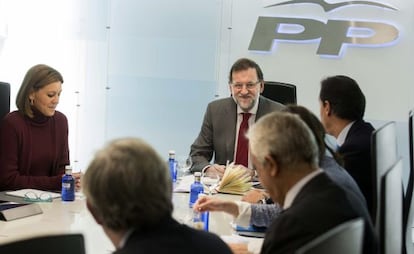Rajoy rules out military support for France before general election
Spanish prime minister wants to wait for a specific request from Paris

Two days after French Defense Minister Jean-Yves Le Drian said he was waiting for Spain to explain how it plans to help it fight Islamist terrorism, Prime Minister Mariano Rajoy appears not to be taking the hint.
With a general election coming up on December 20 that could see his Popular Party (PP) lose its majority, Rajoy is keen not to open a new front on the eve of the campaign by offering military support.
Sources close to the prime minister said that if France were to make a specific request before that date, Rajoy would first consult with opposition leaders to craft a common response, then put it to Congress for approval.
The government would rather “act prudently and without rushing into anything”
Last Thursday, EL PAÍS reported that Rajoy was considering bolstering the Spanish contingents in Mali and Central African Republic as a way of relieving French troops of their duties there and freeing them up for action in Syria.
But one hour after a hotel in Bamako was stormed by attackers who killed 27 hostages, the Spanish government issued a statement strongly denying any intention of raising Spain’s presence in the volatile Sahel region.
On Monday, a government spokesman said that the statement was not triggered by the Bamako attack, but by criticism voiced by the secretary general of the Socialist Party, Pedro Sánchez.
A spokesman for the Defense Ministry said the government would rather “act prudently and without rushing into anything” because “these things take time and there are procedures to follow.”
The question of whether Spain should offer support or wait for a request from Paris is a moot point: in diplomatic relations, nobody publicly asks for anything unless they already know that the answer is yes.
In the meantime, Spain has been left on the sidelines while French President François Hollande meets with leaders from Britain, the United States, Germany, Italy, Russia, China and Canada in order to forge an international alliance against Islamic State (ISIS).
The only time Rajoy and Hollande have spoken, according to the Madrid executive, was on November 14, when the Spanish prime minister phoned to express his condolences after the Paris attacks the day before. There are no reports of conversations between the French and Spanish ministers of defense or foreign affairs, either.
France has invoked a EU treaty article that calls on all members to provide “aid and assistance using all means at their disposal” to another member that has been attacked. London has already authorized Paris to use its airbase in Cyprus and contributed a frigate, as has Belgium. Germany announced it is increasing its military presence in Mali.
Rajoy is hoping that France will not make any requests for military support before election day. His former mentor José María Aznar, who was Spanish prime minister between 1996 and 2004, supported the US invasion of Iraq in 2003 despite great domestic opposition. The PP lost its re-election bid the following year, just three days after Islamist terrorists killed 191 people in the Madrid train bombings.
English version by Susana Urra.
Tu suscripción se está usando en otro dispositivo
¿Quieres añadir otro usuario a tu suscripción?
Si continúas leyendo en este dispositivo, no se podrá leer en el otro.
FlechaTu suscripción se está usando en otro dispositivo y solo puedes acceder a EL PAÍS desde un dispositivo a la vez.
Si quieres compartir tu cuenta, cambia tu suscripción a la modalidad Premium, así podrás añadir otro usuario. Cada uno accederá con su propia cuenta de email, lo que os permitirá personalizar vuestra experiencia en EL PAÍS.
¿Tienes una suscripción de empresa? Accede aquí para contratar más cuentas.
En el caso de no saber quién está usando tu cuenta, te recomendamos cambiar tu contraseña aquí.
Si decides continuar compartiendo tu cuenta, este mensaje se mostrará en tu dispositivo y en el de la otra persona que está usando tu cuenta de forma indefinida, afectando a tu experiencia de lectura. Puedes consultar aquí los términos y condiciones de la suscripción digital.








































